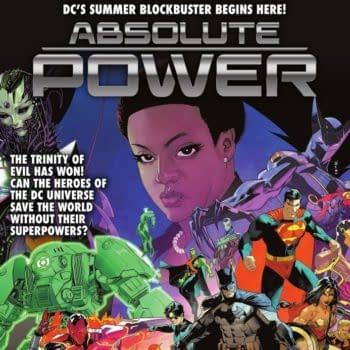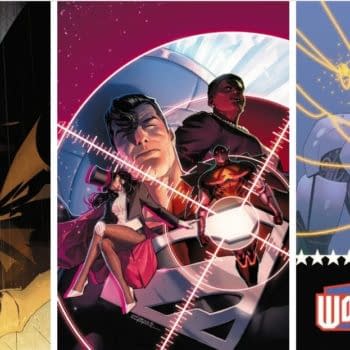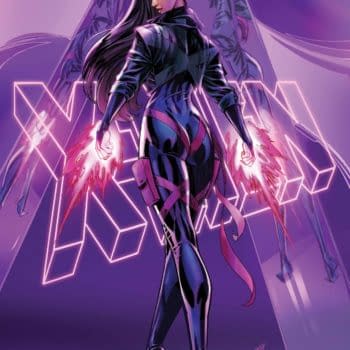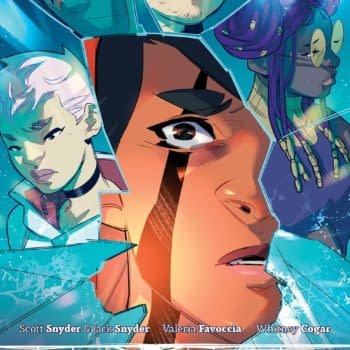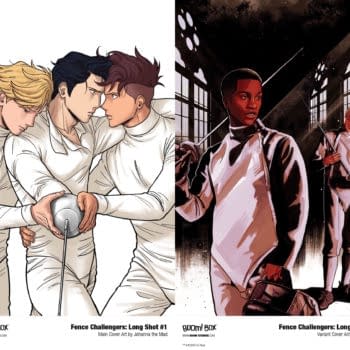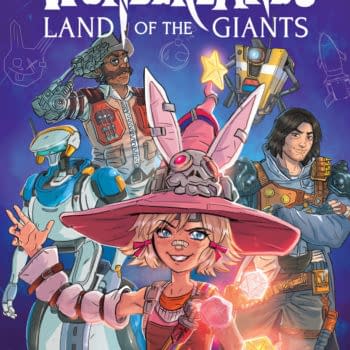Posted in: Comics, Recent Updates | Tagged: Comics, entertainment, gambit, image comics, james asmus, quantum and woody, superior foes of spider-man, The End Times of Bram and Ben, thief of thieves, valiant comics
How To Tell A Tasteful Gay Joke – Talking With Quantum And Woody's James Asmus
By Joseph Kyle Schmidt
Voting for the Harvey Awards closes in just a few days. If you've taken the time to vote, you're probably familiar with the name James Asmus.
The writer of Valiant's Quantum and Woody has been plastered all over the ballot, nominated for three awards including Best Writer, Most Promising New Talent, and Special Award for Humor in Comics, while the book itself also nabbed nominations for Best Letterer (for David Lanphear), Best Cover Artist (for Andrew Robinson), and Best New Series.
Asmus has written plenty of different books, from the heists and capers of Thief of Thieves and Gambit, to apocalyptic ridiculousness in The End Times of Bram and Ben, to the inept criminals of Superior Foes of Spider-Man, and even teenage mutant angst in Generation Hope. With flashes of brilliance in each title, it's not hard to see an immense talent guiding the pen. The amount of humor, nuance and care in his scripts and character's dialogue drips off the pages, and it helps that he's surrounded himself with great artists.But that talent has never been more apparent than in Quantum and Woody, a book that you literally have to set aside because your sides ache with laughter.
Asmus recently spoke at length about his comedic stylings and background, his love for working on the Valiant relaunch, the Harvey nominations, toeing the line of what's inappropriate, and his return to creator-owned storytelling. Here's how it went down.
Bleeding Cool (Joseph Kyle Schmidt): It seems like Quantum and Woody is up for every Harvey Award on the ballot.

BC: I've been familiar with your work since you took over Generation Hope, and for a minute there it seemed like you were becoming a regular member of the Marvel bullpen, especially after writing Gambit. Are you surprised by the way your career has turned out?
JA: Sort of. I don't really ever anticipate what my career is going to be. I've worked in theater, comedy, comics, television, video games. I more so just look for projects that excite me or that sound like fun. Projects where my mind races ahead of me always turn out best and they're always the most fun to work on and I'm happy to do that in whatever medium the story wants to be in. There's definitely characters I love at Marvel, and there's a lot of people at Marvel I love working with, so I thought I could have been there for a long time as my mainstay.
But when Valiant reached out to me about Quantum and Woody, I was such a fan of that series that I knew I wanted to take a crack at it. But I told my wife and told myself I was only going to do it if they approved this storyline that I got excited by. It just felt like the wrong book to compromise too much or to lose track of a real sense of intent and of personal honesty. The original series, I can't imitate Christopher Priest but I can kind of take the values of using this as a semi-subversive way to play with things that interest you or opinions you want to bat around. So though I wouldn't have necessarily thought to go knocking on Valiant's door when the opportunity came up, I wanted to give it a try and it's been such an amazing experience and so empowering that it kind of spoiled me. [Laughs] I've sort of taken myself off of the market from doing projects that are maybe less a natural fit for me.
BC: So it's not that you didn't like the other books, but Quantum and Woody spoiled you.
JA: Yeah. Around the same time, I did a creator-owned at Image that I co-wrote with my friend Jim Festante called the End Times of Bram and Ben. I really enjoyed and felt lucky with so much of my Marvel work being projects that felt like the right fit for me, but it was really something else doing a creator-owned. It felt like when I was writing plays just to be exactly what I wanted them to be in Chicago. And not having had that experience in comics, where the reins and the blinders were off and I could be an animal running free, I sort of had not realized I could do that in this medium, which sounds ridiculous but it's just never been that way for me. So once I got that feeling on End Times and then Quantum and Woody, I kind of stopped making myself available for work-for-hire for the most part. I also had a baby born at that time, and I was working on a TV show and a video game, and I felt like I was going to keep my comics experience as pure as possible.
BC: What video game and Television show were you writing for?
JA: The video game was a Marvel game. It was a mobile card battle game called X-Men: Battle of the Atom. I helped craft some of the storyline stuff, wrote a bunch of dialogue, and helped them write up profiles on characters. The TV show I wrote for is called Crypted: The Swamp Beast on the History Channel. That was an interesting experience where this production company that had done a reality show following a Bayou sheriff's department in Louisiana was developing a second show about folklore and superstitions unique to Cajun culture. It was a separate show about the weird things happening down there. They wanted me to come in and help craft the way they were putting the stories together, which was a really odd experience but a really fun one and pretty fascinating. I had lived in Louisiana for college, so they also wanted someone who was kind of familiar with that stuff.
BC: I imagine you're very familiar with that stuff.
JA: I actually went to college for theater to study acting and writing. I auditioned a couple of places including where I ended up going, Loyola University New Orleans, and just the minute I set foot in New Orleans I knew I wanted to live there. It's a unique place, it feels so completely alive. You immediately feel like it is unlike any other place in this country. It felt inspirational. It felt like it was speaking back to you. So I understand why there are so many supernatural myths and beliefs about that place.
Whether it's ghosts—there's so many ghosts stories there—but also the voodoo culture that came over through pirates, through slave trade, through a whole bunch of cultural interactions from it being a port city. Then also violence that's been there. The melting pot that it became, it kind of twisted other people's, other culture's beliefs and stories into something that is particular to the region. So when I was living there in school, I read a whole bunch of local history and local folklore because it was so fascinating to me. And it was right on hand. Super unique and really rich. I don't know if that's why they asked me to write Gambit, because he's cajun, because the first note they sent to me, "we don't want it to be just going back and setting him in New Orleans." And I'm like, why am I, what… [laughs]
BC: Maybe they wanted someone who could at least make him sound Cajun without overdoing it.
JA: It's funny, some fans complain I didn't get his accent right. I'm like, no, I got what he would actually sound like as opposed to what some other people have written him to be.
BC: Was there any apprehension to doing Quantum and Woody because the original run is held in such high-esteem?
JA: Definitely. But what gave me pause was less that it was held in such high-esteem and more that it had only been done by the original creators of Quantum and Woody, that I would be the first other person to create adventures for them. The idea that "something good has already been done with this," I had to get over being afraid of that when the first job I ever got in comics was to write X-Men stories. To me, the X-Men were what made me become a comic book devotee in my childhood, and I still think there's a lot of great work done that's been done by different creators in X-Men. I had to get over that fear pretty quick and just realize that I'm going to try and do something that's distinct to who I am and my sensibilities, and there will be people who like mine more and there will be people who like someone else's version more.
It is tough when you know something was critically loved AND short lived. At least with the X-Men I had the benefit of, "AND A BUNCH OF PEOPLE MESSED IT UP." I could at least be somewhere in the middle of the pack. But with Quantum and Woody, it just has one beloved period of time. Luckily enough time has passed and I think a lot of people missed it. To me, worst case scenario, I am going to make stories that are fun that introduce these characters to a whole new readership and then they can go track down the Christopher Priest and Doc Bright run and enjoy that themselves. It's being collected in a complete omnibus in the next few months, which I am so excited to own because I had gaps in my collection. I came to Quantum and Woody as a reader after it ended, it was recommended to me, and there were still issues I was never able to track down. So when Valiant approached me about maybe doing Quantum and Woody, I was just excited they could send me PDFs of all the issues I didn't have before. I thought, if nothing else, I've lucked out because of that, but the rest of it has just been a dream come true.
BC: You said you had a story you wanted to tell. Did you have the whole idea of the plot formed?
JA: Sort of. When they first asked me, I was like, well I'll try to come up with something. I re-read the old ones and I figured out what intrinsically felt necessary and exciting and beloved about the original concept. Then I just tried to contextualize and see if I could streamline some things so that more aspects of the story came from the same place for my version. Almost immediately, everything jumped into each other.
I said earlier, the things I want to write are the ones where the ideas run faster than I can keep up with. I know there's something. I know the answers are true and I know what I'm coming with means something, I'm tapping into something, when the answer is so clear and so certain faster than I can sit here and try to be clever about it, when it just explodes from me. I just started typing and the next thing I knew it's three hours later and I have a five page document outlining the entire first arc with some notes about what happens afterwards. For example, Goat #0, which wouldn't come out until our ninth issue, was part of my first pass at trying to come up with the plot because I knew some dynamics I wanted to have be true behind the scenes that we would reveal later. I'm trying to avoid spoilers for a book that came out six months ago. [laughs]
BC: Well the Goat reveal was so good. I actually laughed out loud and my wife had to ask what was so funny.
JA: Nothing is more gratifying to me than hearing people have actually laughed out loud when they read Quantum and Woody, because having spent so long performing comedy live, it's so weird for me to work hard on the jokes and never have the payoff of hearing people laugh. So just hearing that people do laugh goes a long way toward making me feel like all the constant revision was worth while. I definitely spend twice as long, if not longer, writing Quantum and Woody's scripts than it takes me to write anything else just because I'm trying to refine the comedic rhythms for comics.
BC: How is the process different from workshopping stand-up material in front of a live audience as opposed to writing jokes and interactions from panel to panel, for page turns?
JA: It's definitely more difficult. I will say, stand-up is still the hardest thing I've ever done in my life. There's no refuge. There's no place to hide if it's not going well. In comics, in theater, in any narrative that I write, I can give you a moment of characters being genuine, being emotional, being sincere, and that has narrative value. That's really the easiest thing to write. [laughs] So I can change it up and find solace in some of these other things. And a character can tell a bad joke and the joke is they are bad at being funny, and that can work. But you cannot tell a bad joke as a stand-up. Your audience just turns on you.
That said, in terms of developing stand-up material, I can slip in new jokes every show and protect them with good material and keep honing that new stuff until it is good. And then if I wanted to make an album or go on video or tour with a joke, I'll know I've tested it on a few pour souls. But with comics, the first time anyone can react to it is when it sees print and your instincts have to be right out of the gate more often than wrong. Obviously some will… humor is subjective, but you have to be right more often than you're wrong. And it depends on having funny artists, or at least people who have a good sense of humor. It has caused me to rely on and have a more hands on relationship with my editors. Because I need them to tell me if something is not funny or to challenge me. Sometimes they just tell me, "eh, you can do better than this."
So I'll sit down and write ten punchlines and send them a list, you know, "editor's choice." Sometimes, one strikes me that I wouldn't have thought of unless I made myself come up with those punchlines. And a lot of times those end up being my favorite jokes because they aren't the easy one but you can start going to weirder and weirder places then find something that really hits with both surprise and tricks. Those are always more gratifying. But it feels like much more of a risk, every time an issue comes out, because I really don't know how many of the jokes work for people. I've really had to come to trust my own instincts and in some cases raise my own standards. Rather than be like, "eh, this is pretty funny," I just write something, delete it. It's not good enough. I just keep churning out material. I probably come up with five times as much material that makes it into an issue of Quantum and Woody.
I'll write something and come back to it the next day and feel like it's not good enough and delete it and write the scene over again until I think it's right. With that, I try to be mindful of when we need something that's not jokes, when to just turn that faucet off, and invest in the characters again or have some pure escapist action adventure moments. I try to be mindful of that balance. I think we try and pick our battles with having really emotional moments with the characters, but I think going there and having sincere vulnerability, having sincere heartbreak in these small doses keeps you caring about them and rooting for them when they then turnaround and do something stupid or reckless. When they otherwise act like the type of people you wouldn't want to associate with but you can't help it because you've really lived with some of their pain too. I think that's an important balance to strike, at least for me. I don't like comedies that are just slapstick and don't grow the characters. I don't love just melodrama about people's suffering. I love having that joy and that comedy, even tied up with tragic characters. It just makes me want to stick with it. In that sense, I'm just doing the book that I would want to read.
BC: When I saw Ming Doyle was doing a stint on Quantum and Woody, I was very interested. Did you want to make her feel as uncomfortable as possible with your scripts?
JA: [Laughs] No, I had started developing the plot for the second arc before I knew who the artist would be. In the macro sense, I just have to come up with the story I want to tell, and then I cater individual scenes and moments to what I think would be fun for my artists or I try and find out if there's certain things they want to chase or have an opportunity to do. With Ming Doyle, I realize how good she is at reaction shots so I put much more into verbal back-and-forth's with the characters. And I think I emphasized putting more scenes where people of very differing world views had to deal with each other.
Because I love the subtlety and compound reactions. She can express the inner conflict of someone between hate and shock or bewilderment and lust. Whatever it is, she can do compound reactions. That was the biggest way I ended up writing to what I loved about her work. Sadly, she was already committed to writing white supremacists, pseudo hillbillies, and paramilitary extremists. That was born more out of exploring the conflict of Eric as Quantum. He sort of fetishized this military lifestyle. And I realized most people who get excited about that are of world views that are different from his. And there were a bunch of things I wanted to play with. To throw someone as irresponsible and undisciplined as Woody is in there. To play with the idea that this separatist culture would love that these guys are vigilantes, but many of the kind of neo-separatists in the United States have super racial agendas or overtones at the very least. It felt like a nice place to talk about race in America which is kind of inherent to what Quantum and Woody was.
And that's definitely been a tricky balance to find as a white dude writing it. As opposed to Christopher Priest, he was finding different ways to express his experience and perspective on race as an African American. That was one of the few things I had to really think about for a bit when approaching this series, how I would do it. For me, it's much more about showing characters and how a spectrum of people deal with or don't deal with race. I think there were more occasions in the original Quantum and Woody where Christopher Priest was basically speaking to you as himself, Christopher Priest. Sometimes through the characters, sometimes through narration, sometimes by breaking the fourth wall. And I think I have less personal experience to do that. Instead I can do that by creating a whole spectrum of characters who represent different experiences and ideology and making it more of unique character perspective and playing those off of each other. I like giving smaller characters really specific world views. Even people in crowd scenes who have one line, I really like to figure out who that person is, through the prism of the one thing they say. It's a fun exercise but it also makes the world feel more rich to me. I feel like there's an opportunity to do that as a way of reflecting diversity and reflecting different opinions about society, about race, fears about that in this series.
As long as I make sure you understand that the person who is racist is a jerk then I think there's room to show that some of these opinions exist and take the piss out of them, to some extent. Which can feel dangerous for some writers. Most superhero comics are still commercial products designed for a broad audience. As much as creators may be able to express themselves through it, there's certain issues that your editors just don't want you to touch. I am very lucky in that. Quantum and Woody was originally created to play a little bit more fast and loose with topics people would usually be uncomfortable with. And that's something I loved to do in my comedy days and in the plays I was writing and now was finally given a thing that is not a creator-owned book but essentially Valiant has empowered me as if it were. They've given me a lot of rope to hang myself with. And I love it.
BC: I really enjoy your portrayal of Woody and how he has the kinds of thoughts people have but shouldn't be said out loud. As a stand-up comic, you can say anything you want without repercussion, so long as you aren't saying it on a morning talk show. During stand-up, you can say some evil things. It's just a part of the routine. Many characters in the comic, but Woody in particular, straddle this line too.
Woody would make a gay joke, but then explain why it's not messed up for him to say that. In comics, you have people that will get mad when Thor is a woman, and then there's are people that will reblog any slight they've received on Tumblr. When you write these jokes, how do you balance that line of being the offensive comedian you can be, while being the social warrior you have to be when dealing with these characters, these properties, speaking to people of all different cultures?
JA: It's not even an obligation for an industry, of Valiant protecting their good name. Truthfully, I far more often empathize with the person who has been wronged by broader society than I ever do with myself as white dude born in America who has been given every opportunity. I realize, broadly speaking, that "I" am the problem. My sympathies are with the people that end up as the subject of Woody's more inappropriate external monologue. In doing improv, my good friend Matt Donnelly (co-host of Penn's Sunday School with Penn Jillette) articulated that has really stuck with me. You can have a character do and say horrible things in comedy so long as the world around them that they inhabit calls them out on the fact that they are horrible for it.
I think it's pretty clear when you read an issue, when Quantum or any of the supporting characters from the ERA, they tell Woody that he's totally messed up for this behavior. He often pays the consequences of being so careless. It's kind of cathartic and funny to watch someone go through this world, he annoys some people, both characters and the readers, but he is who he is. It's fun to write for someone who is so inappropriate and as long as he's reminded he's wrong, or that he pays the consequences for it, then I think it's very easy for readers to see we are not validating his world view. When that's the case, whether they think about it consciously or not, they don't really feel attacked. People aren't made to feel on the defensive and so you don't have that same, I think, people turning to look for similar outrage or to look for catharsis. I think that happens when people see something that does make them uncomfortable, or makes them feel attacked, or just makes them uneasy and then the story doesn't treat it as if that's the case.
I think a lot of what becomes outrage starts when someone posts something to say, "Am I crazy for feeling this way? This happened, does it bother anyone else?" I don't think they're saying, "GRAB YOUR PITCHFORKS!" I think they're using the internet for what it has become. It's people of really specific perspectives trying to find each other. I felt weird for reading comics. But now everyone I talk to on Twitter now reads comics because I was able to connect with those people. But I had to reach out and say, you know, "Is anyone out there?" But I think when stories put in things that are really charged for people and the narrative just chugs along and doesn't take the time to acknowledge that the subject may be difficult for people, I think that's when some people look for other reactions to see if they're crazy, to see if they're reading it the wrong way. And then it can spiral into being about something else.
But I think in Quantum and Woody, I try to make it clear that everyone is kind-of wrong in this world, and when someone is insensitive, someone else will acknowledge it. There's an acknowledgement that these things are taboo, that they're insensitive depending on what the issue is. I think once people realize, "Oh yes, being a trans person," as an arbitrary example, "being a trans person is a difficult experience. It's very loaded. There's a lot of negativity you have to deal with from people." That said, Woody is a total jerk and he's a steamroller. Over everybody. And that was part of the benefit too, in the second arc he's just as obnoxious to a rich white guy as he is to, in the next arc, his gay teenage best friend with AIDS. He's too insensitive to everyone. It becomes a great equalizer in that sense. I think as long as you are at least acknowledging the precariousness of these real world issues then that feels like more respect is paid to them in many other case where they're a plot point as opposed to a character.
BC: As a writer, are there certain topics that you won't broach because you feel like you're pandering?
JA: I don't really believe in categorical absolutes. So I don't have a list of topics I won't ever do. My comedy group, Hey You Millionaires, one of the things we explicitly talked about trying to do, and this is definitely something I did in some of the plays I wrote, we wanted to figure out topics people were uncomfortable or thought "you shouldn't do comedy" about. We tried to find a way in that wasn't, "oh we're just going to say the shocking thing." We're not just going to say what you shouldn't say. But it's a question of, okay, let's get right up next to what this is in a space that people usually flinch and turn away, and let's see if we can find a thing here that you can talk about that is not offensive but is still really playing with fire and is very close to what makes people uncomfortable about it, but can you play in the space in a way that reveals a nuance in a space that we usually just turn away. It's probably hard to really make it clear what I'm talking about without examples. I think topics should never be forbidden in any artistic medium, even if that's comedy, but I think the more sensitive an issue, the more important the type of approach you make is. What exactly you're trying to say with it becomes much more important.
BC: You can't just have a funny gay joke.
JA: Right. What are you saying with it? We went around and around something in the first arc with when they decide to become superheroes. The concept is that they will both wear these ridiculous spandex superhero outfits. Woody says, "Oh no, I saw myself in the elevator coming up here and I looked way too gay." And then he's like, "Oh, I don't mean that derogatory, I mean I literally look like my friend Gay Dave that I used to go clubbing with." You see that this guy has nothing against homosexuals, homosexuality, he just wants to make sure women know he's DTF. He's too concerned with getting laid to ever risk someone thinking he's off the market. And that becomes a joke with him.
BC: He has a friend named Dave that he has to call Gay Dave.
JA: Exactly! And that's the thing, it's very clear in this world that Woody is the jerk. At the same time, well, that's his friend he's willing to go clubbing with! He has these relationships, which is a lot more than what a lot people who want to pay lip service to a cause have. They don't do anything for it, they aren't really a part of a community but they would use lip service to make themselves feel more enlightened. Oh no, he's really there. He's just also a jerk at the same time. I think there's a complexity to that. The moments of compassion from Woody, the moments you see he's actually there for the people who matter to him, and really he's open to whatever.
He's less judgmental than a lot of people. He's just so glib about everything that it seems callous. But you realize he's actually more permissive and sort of "live and let live." I think the end of the first run of the series, in issue 12, he's like "Yeah you villains just tried to kill us, but we'll talk about this. What's up?" And Quantum is totally furious but Woody's like "I don't know, maybe there's something to this. We can hash it out." He really is the most open and forgiving person, but to a certain extent it comes from that he doesn't really care about a lot. [Laughs] He let's stuff slide. "You be you," as long as it doesn't stop Woody from doing whatever he feels like he's cool. That's a big part when you were asking how can we get away with certain things in this book that people might be upset about. I firmly believe that when choices are couched in the specificity of a character… If you just have one, let's randomly say, hispanic character in the book and that character is a villain, it's easier for someone to say "that's a negative portrayal of hispanics."
Especially if that character is super generic. But the more you make them a well rounded, complicated, interesting person, the less anyone could misread it as, "oh, you're saying all hispanics have a fixation on ice cream and keep wondering if they need to lose five pounds and spend too much time online shopping." The more you have all of these quirks to a character, the more you give them specificity, the less likely someone is to mistake them for what a writer or editor secretly thinks of all blanks. Of all homosexuals, all Republicans, all whatever. That's just it. Trying to make everyone feel like a truly realized character, or person, takes the edge off things. Then we realize that character is wrong. That character is evil. That character is cowardly. As opposed to anyone thinking, "oh they're saying this is true about the world." So basically that's me advocating for giving characters more personality and making them less like stock tropes. I think writers will get in less trouble.
BC: What was your experience in creator-owned and would you do something else?
JA: I will tell you, you're the first public outlet in which I'm saying this, my co-writer Jim Festante and I just met this week to start a new project together. It will have a similar energy, but a totally different story. This is sci-fi. This is sci-fi gone wrong. We're getting aggressive about it. In one writing session, we plotted the whole story and created a bunch of great characters and bits. I think it's going to go pretty quickly. Hopefully we'll have it set up and we'll be able to talk about it soon. Really the reason I haven't done more creator-owned is a mixture. In the last two years, I've even really happy with the jobs I've gotten. I felt really fulfilled.
I wasn't quite as starving for that outlet as I was before I got Quantum and Woody. The other part of the answer is, I'm very spoiled in that I've gotten to work with amazing artists. With Valiant, Image, on Thief of Thieves. I'm so spoiled that when it comes time to do creator-owned, I want someone who is that good. And those people are usually booked for the next year and are getting paid more than I could pay them. It's been a little tricky. I've tried to get a few things off the ground… I'm also really bad at asking people. Because I didn't come up through the ranks with my self published book at conventions, I don't have a group of creators that I came up with it. I came into comics sideways from theater and immediately started working with Marvel's artists. One of my first stories was drawn by Mike Allred. But, you know, he's BUSY. It's not like, "time for me to call in that favor," and have him draw a creator-owned miniseries, as much as I would love that. I'm working on it now, though. I have too many ideas that I really want to do creator-owned. The one with Festante, for fans of End Times, for fans of Quantum and Woody, there will be a lot to love. Hopefully we can talk about it soon.
Follow Joseph Kyle Schmidt on Twitter at @woeisjoe
















